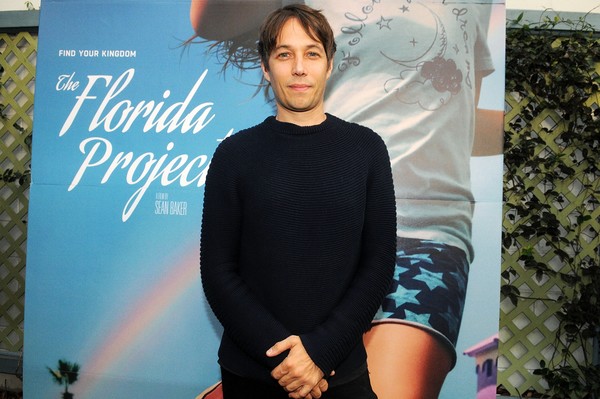
“The Florida Project” – Interview with Sean Baker
by Sara Michelle Fetters - October 25th, 2017 - Interviews
Surprise in Discovery
Director Sean Baker on the Childlike Realism of The Florida Project
Sean Baker’s The Florida Project is the best film I’ve seen in 2017. It’s one of those rare motion pictures where I knew I’d just watched something monumental the second it had come to an end. Much like other recent instant classics like Michael Haneke’s The White Ribbon, John Carney’s Once, Barry Jenkins’s Moonlight, Richard Linklater’s Before Sunset, Kathryn Bigelow’s Zero Dark Thirty or Asghar Farhadi’s A Separation, I was so completely blown away by what I just experienced I was speechless as I left the theatre. Baker’s latest held me in complete and total awe, allowing the film to transcend its relatively simple story to become something deeply affecting on a level going way beyond personal.
At the center of things is six-year-old Moonee, portrayed magnificently by newcomer Brooklynn Prince. She lives with her unemployed, hard-living mother Halley (Bria Vinaite) at The Happy Castle motel in Kissimmee, Florida just down the road from Disney World. A thorn in the side of scrappy, if still understanding building manager Bobby (Willem Dafoe), this little girl spends her summer exploring the environs surrounding the motel with her small cadre of friends, not quite understanding just how tenuous things are for both she and her mother, the duo always on the precipice of being homeless with no one to turn to for help.
The secret of the movie’s success is just how completely it keys into this childlike mindset, how fully it comprehends how a kid views the world, their innate ability to find the beauty in even the most disgusting or abhorrent of situations an ability deserving of being cherished. Additionally, much like Baker’s award-winning 2015 comedic stunner Tangerine, this film is a celebration of friendship, Moonee’s ability to make intimate connections with everyone she comes into contact with a beguiling talent that ultimately is able to bring her some form of cathartic solace as The Florida Project moves towards their heartbreaking conclusion.
I had the chance to sit down with the talented Baker to talk about his latest feature during his recent visit to Seattle. Literally less than an hour before our scheduled interview, the Gotham Awards, a set of independent film awards voted on by a small panel of New York journalists in October that signal the start of awards season, culminating with the Oscars in February, were announced for 2017. The Florida Project was one of the big winners, the film receiving three nominations for Best Feature, Best Actor Willem Dafoe and Breakthrough Actor for Brooklynn Prince. With that information as the prelude, here are some of the highlights from my conversation with Sean Baker:
Sara Michelle Fetters: So, how’s your morning going? I’m just going to assume today is nothing more than a boring, relatively humdrum day, right?
Sean Baker: Yeah. [laughs] Exactly. It’s good to be in Seattle talking about the movie.
Sara Michelle Fetters: Were you surprised at all by this morning’s announcement? Any of the nominations catch you off guard?
Sean Baker: I woke up to them, the Gotham Awards announcement, so it was like, wow.
The first thing I saw was Brooklynn Prince [nominated for Breakthrough Actor], so the fact that she was nominated means everything. Her performance, I didn’t have to manipulate it with editing or anything like that. Her performance is there and she is deserving of this, so I’m so happy. Also, I mean, I just have to say, that company! Get Out and Call Me By Your Name and Good Time and Lady Bird and I, Tonya. I’m just honored to be in that crowd.
Sara Michelle Fetters: Is this still a little surreal for you? All of this recognition? Or are you used to it after all the awards and nominations that went to Tangerine just two years ago?
Sean Baker: Yeah, it’s nice. And it’s really nice because [the awards] bring attention to the older films, too. It is a great feeling. It’s really wonderful that audiences are connecting, I appreciate it. I always thought these films, at least the last two, Tangerine and The Florida Project, I thought these were going to be polarizing films. And this film does have its polarizing aspects. The ending, I can tell is polarizing. I didn’t know that it was at the time, that was a surprise, actually, but it’s also a great thing as it means people are really attempting to find meaning in every second of the film.
But to tell you the truth? To have that support from the critics, to also have the public that’s into movies like these embrace them so completely, that means everything. It took me so long to get recognition from the industry and the studios, so the fact that it’s been coming from people who care about films, who care about great stories, that’s great.
Sara Michelle Fetters: I know that you a co-writer Chris Bergoch had worked on this idea for The Florida Project for quite some time. If I read correctly, you actually had a general idea for this film before you made Tangerine.
Sean Baker: Yeah, and we just couldn’t get funding for it, because it was a low budget, but not a micro budget. We would actually have to go there, to Florida, and I wanted to shoot on film. Then there are the kids, of course, which was another complication. We couldn’t find financing. We were actually really upset. I mean like Chris and I were just like, how many times do we have to prove ourselves in this industry? Starlet did well to a certain degree, at least critically, so we were understandably upset.
We went ahead, we asked [Tangerine producers] Mark and Jay Duplass whether their offer was on the table to make a micro budget movie. It was, so we went ahead and made Tangerine. That film opened up the doors and found us financing for The Florida Project, and then in hindsight Chris and I were like, if we had made this in 2011, not only do I think it would have been stylistically different, because Tangerine actually helped guide us to how we realized this one, but Brooklynn would have been one-year-old. I mean, the movie is Brooklynn. I can’t imagine what would have happened if we made the movie at that time. We’re very happy now, to say the least.
Sara Michelle Fetters: Where do you find that balance in telling a realistic, issue-driven story? I mean, there are hard issues at play in The Florida Project, but there are seen through the eyes of a child. Maintaining that level of innocence, that level of humor, that level of empathy and compassion, all of which that is very child-like yet still ends up being universal, how do you do that? How difficult is this to accomplish?
Sean Baker: It’s subjective. Every audience member will feel slightly different about it. To tell you the truth, it was a balancing act where I had to just rely on what we thought was appropriate in terms of how far to push things in one direction or another, how much to show the audience and how much to keep them in the dark just as much as Moonee is. It was a balancing act, being there on location and figuring out our camera angles and how much we would be separated from the adults. All of that.
Then in post production, where I basically had to decide what to include and what to leave on the cutting room floor. We had actually shot some scenes, I don’t know if you know this, but we shot some scenes for safety purposes that explained a little more in detail in a procedural way how the Florida Child Protection Services would happen, how they would get involved, as well as some more adult-oriented scenes. We wrote and shot them, and I think they’re good. They’re fine, but they don’t belong in this movie, in Moonee’s story. In post production, that was like my balancing act, removing those scenes and putting in stuff that had to do more with just extraneous hanging out with the kids. That stuff I thought got us closer to what our goal was, to have audiences connect with the kids and feel for [them].
Sara Michelle Fetters: There was a lot here that reminded me of early Ken Loach films, especially Kes.
Sean Baker: Oh my gosh, yes! Well, he’s my hero, and I’m trying to get [Ken] to see the movie. I have to write him a letter. I know his producer saw the film at the London Film Festival just the other day. But he’s an inspiration and somebody who I think has always had a singular mission. A lot of people don’t talk about this, but actually he has a lot of humor in his films as well, behavioral humor. Even Kes had it. I mean God, the whole soccer scene, right? The soccer scene is one of the funniest scenes ever shot.
Sara Michelle Fetters: But that scene also leads to a subsequent moment of drama that’s…
Sean Baker: Yes! Exactly.
Sara Michelle Fetters: …quite emotional.
Sean Baker: It’s pretty amazing.
Sara Michelle Fetters: The Florida Project does that as well. I don’t want to spoil it for viewers, but there’s this scene where a stranger wanders onto the hotel grounds and is watching the children play, and Willem Dafoe during this sequence, he’s hysterical. But the kicker to the scene is almost like a punch in the gut. It adds so much insight into his character and how seriously he takes his job. It’s something else.
Sean Baker: That’s why you have to find that balance, because that’s what life is. It’s always a combination. It’s always a little bit of both, comedy and drama. Every scene had a little bit of that balance. I mean, when we were shooting it, that scene, we were all trying to contain our laughter. But at the same time there was a wait to when the minute would come where we would think about the crux of the scene and how serious it was. It would change everybody’s mood on set.
I wanted to capture this exact thing. It was like it was this constant attempt to play with people’s emotions in a way. Because that’s what life is, right?
Sara Michelle Fetters: I feel like we were introduced a little bit to this world in Ramin Bahrani’s 99 Homes.
Sean Baker: Oh yeah. Definitely.
Sara Michelle Fetters: In that film, we weren’t really given enough information to fully understand what’s going on at these Orlando hotels. I love that The Florida Project doesn’t really mention the housing crisis, doesn’t really say this is what has happened, not just in Florida, but pretty much everywhere; it’s all just sort of a give. There is some fairly obvious commentary, however, I think, these hotels being right in the shadow of Disney World. Walt had very definitive utopian ideas as to what he felt defined “The Florida Project,” and in many ways that’s what Epcot was supposed to be all about.
Sean Baker: Well, it is where we got the title of the movie, after all. [laughs]
In all seriousness, I think so many Americans have actually been either affected by the housing crisis personally, or they’ve experienced it via second or third degree. I think Americans get it. I mean, I think they understand the situations so many at this budget motel “The Happy Castle” are going through going in. It’s like a given. There’s a political and an economic landscape that they’re already familiar with as well.
But again, we see the story through a child’s perspective. They don’t understand the housing crisis. They’re just living through its aftermath.
Sara Michelle Fetters: As to seeing things through a child’s eyes, when did you know Brooklynn was the one to play Moonee?
Sean Baker: I have to re-watch her audition, but I’m pretty sure that I felt it in my soul within a few seconds of her walking into that room. I knew she was going to be in the film, definitely, but I was pretty convinced she was going to be Moonee even within those first few minutes. She came in and just was like, wow. She just took over the room. She came in with Christopher Rivera [who plays Scooty]; we had grouped them together just by coincidence. Theirenergy, even though they didn’t know each other, it was amazing. They had an undeniable chemistry. They were doing these exercises on the floor to get all psyched up. It was really funny to watch.
Then when we were asking Brooklynn to do these scenarios, we would say, “Hey, we’re younger kids and we’re in the pool. You guys have to come over and kick us out and tell us the reasons that we have to leave.” She would come over and be like, “You younger kids, you’re not cool. You know why? Because you don’t even know what cool is. You know what cool is? Getting to stay up after 8pm. That’s what cool is, so get out of the pool.” She would improvise this stuff that was really from a child’s point-of-view. It was pretty incredible, and I knew that she would have that skill of comedic improvisation if we needed her to do that. And we eventually used a lot of that, too, because she was so good at it.
Sara Michelle Fetters: Brooklynn not only has to interact with the other kids in a believable way, but she has to have real chemistry with Bria Vinaite, who plays her young mother Halley, too. These two together…
Sean Baker: It’s amazing, right?
Sara Michelle Fetters: Exactly. When did you know you had something special with these two?
Sean Baker: They got along very quickly. I think they had a matched energy, and that’s what I was looking for. When they actually read together, Bria had read the script, so she understood it was like a mother/daughter relationship, but I told her, “Don’t go into the audition thinking that. Think like this is a sibling relationship.” Haley is a young girl who never had the chance to grow up, so she’s child-like herself. I wanted her to act like Moonee’s sister, not her mother. I think that really helped, because from the first minute they were singing Top 40 songs that even I didn’t know, but they did. It was really great to see. I also think that Brooklynn actually likes hanging out with Bria and is excited by her. That certainly helped.
Sara Michelle Fetters: Over the course of all of your films, but especially these last two, Tangerine and now The Florida Project, you’ve developed a definite track record of being able to work with acting newcomers, guiding them to do just extraordinary work.
Sean Baker: Thank you! And thank you for calling them newcomers. Because a lot of people refer to these cast members as “nonprofessionals,” which I don’t think is correct. They’re newcomers. They’re first timers. They are not non-actors or nonprofessionals. Calling them such just isn’t right.
Sara Michelle Fetters: With that being the case, how does someone like Willem Dafoe walk into a mix like this? How did he fit in?
Sean Baker: I actually throw all of the credit to him. I mean, Willem really wanted to blend in. He’s transformative. He’s such a patient, nice guy who is just incredibly kind and wants to help. He doesn’t have that Hollywood diva thing. I didn’t have to deal with any of that. Instead, he was just there to be a part of the ensemble. He gave words of encouragement to Bria, and he genuinely liked the kids. He was very patient with the kids. Christopher would always be jumping on his lap saying, “It’s the Green Goblin!” and then take a selfie. But was a I concerned if this would be the case? Certainly. But those concerns vanished almost immediately. Willem was very patient. A team player. He’s an extraordinary man.
Look, every time I put in any face who is recognizable in any of my films, like James Ransone in Tangerine, I always get a little bit worried. But when you can choose actors that are this talented who can slip into worlds like these so effortlessly? It’s pretty cool. It’s cool being able to choose actors who can do that.
Sara Michelle Fetters: I have to wrap things up, but I do have a couple of final questions. The first of which is arguably a little more personal than I should probably ask, if that’s all right.
Sean Baker: Certainly. Shoot.
Sara Michelle Fetters: For me, while I am not a person of color or have ever been a Transgender prostitute, it’s still pretty obvious Tangerine was still pretty affecting for me. I’ve always felt, my journey is my journey, my story is my own, and in the end I want my work to speak for itself outside of anyone’s preconceptions or misconceptions about who I am.
Sean Baker: Exactly. That’s how it should be.
Sara Michelle Fetters: But, even so, what affected me so much about Tangerine was how universal Sin-Dee and Alexandra’s stories proved to be. I was shocked at just how much I could relate to what they were going through even though their individual Transgender experiences were so far removed from my own.
So, I wonder, how do you do that? How do you make these stories in Tangerine, in Starlet, in The Florida Project, these tales about marginalized people living on the edge of society, and make them so universal?
Sean Baker: That’s very nice of you to say. All of that. Thank you.
To try and answer, I honestly feel that it’s really about finding the common threads. I mean the universality of everybody, and looking for those story lines that could happen anywhere, in any corner of the Earth. I mean if you look at Starlet, it’s about an inter-generational relationship, and that could happen anywhere. Tangerine had to do with friendship and infidelity, and a lot of people have obviously been through that. I mean everyone has a best friend, everybody has been hurt and everybody has had a broken heart. Then with this film, it’s about childhood. We’ve all had our childhood. To represent that collective childhood, that’s what the goal…I mean not the goal…I mean…I don’t know. It’s honestly hard to say it’s a goal, but it is something that I know as a moviegoer, when I go to a movie, I always want to connect with the protagonist, and I feel you often connect with the protagonist when you see a little bit of yourself in them.
I think that that’s what people are responding to here with these films. They’re saying, I never thought that I would be able to identify with a Trans woman of color on the corner of Santa Monica and Highland, but I can. I love them and I feel like they remind me of the relationship I have with my sister or my best friend. That’s what’s helping, I think. See, when people say, “You humanize characters,” what they maybe fail to see is that they are already human. It’s really difficult to speak about it, but I just feel that the goal with these films, if there is a goal, it’s to really show the common thread amongst all of that. Hopefully that leads to empathy, because if you can empathize with a character, even if you can’t 100-percent put yourself in their shoes and walk in their shoes, that helps make the world a better place. Don’t you think that’s the case? I hope it is.
Sara Michelle Fetters: Finally, at the end of the day, what do you hope people take away from this film? More importantly, if they come out wanting to learn more, to do something about the issues discussed and highlighted by The Florida Project, what advice would you give them?
Sean Baker: Well, thank you for asking that, because that’s very important.
To answer the first questions, I want there to be 100 minutes of entertainment in the theater, okay? People are putting out their hard-earned money and they’re dedicating a night, which is a big deal to ask people in today’s day and age when they can go home and do pretty much whatever. You understand?
Sara Michelle Fetters: Definitely. I do indeed.
Sean Baker: But that second question, that’s the important one. So very important, because the thing about a film like The Florida Project is to actually hope that awareness is brought to this issue, which I think is one that does not have the light shined upon it all that often, if it all. I certainly didn’t know about it. Not before making the movie. And it’s nationwide. It could be happening in your own community, it probably is happening in your own community, so if you care about these characters, Moonee and Halley and Jancey and Scooty and Ashley and Grandma Stacy and the others, and you care about the real Moonees out there, the first step is to look into your own community. In every community, there will be an organization focused on trying to develop affordable housing, and I think that whatever one can do to support them they should do.
And that doesn’t always mean donations. I’m not asking anyone to throw money at any organization, even thought that can be a great thing, but support can come in other ways as well. It can come in advocacy, in volunteering. It can come just via awareness, by spreading that awareness, and so that’s what we’re really asking people to do.
They don’t have to focus on Kissimmee and Orlando, of course, but if they do, there’s a wonderful organization there called The Community Hope Center, hope192.org, and they’re outstanding. But this is a film that is obviously addressing a national issue. So look into your own community. Right here in Seattle. You’ll likely be surprised at what you’ll discover.
– Interview reprinted courtesy of the SGN in Seattle
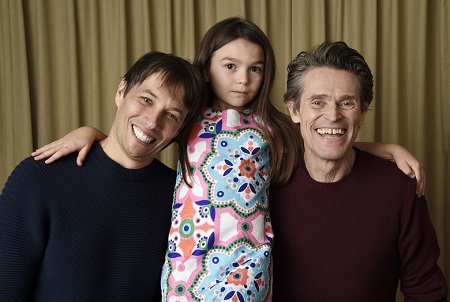
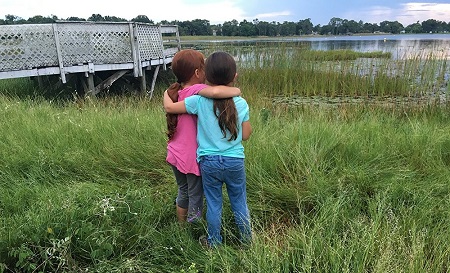
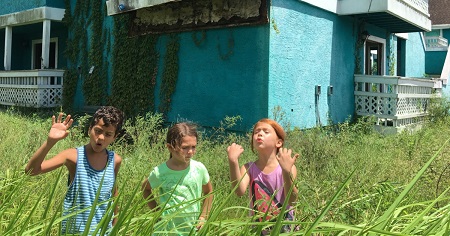

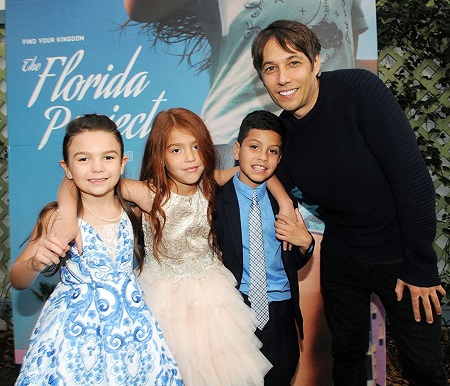
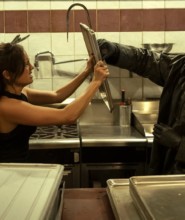



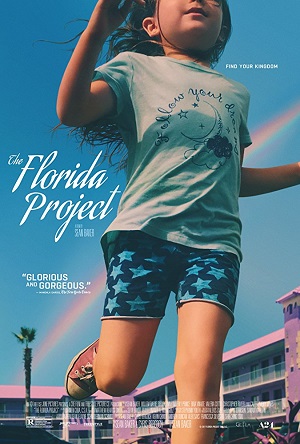
One thought on ““The Florida Project” – Interview with Sean Baker”